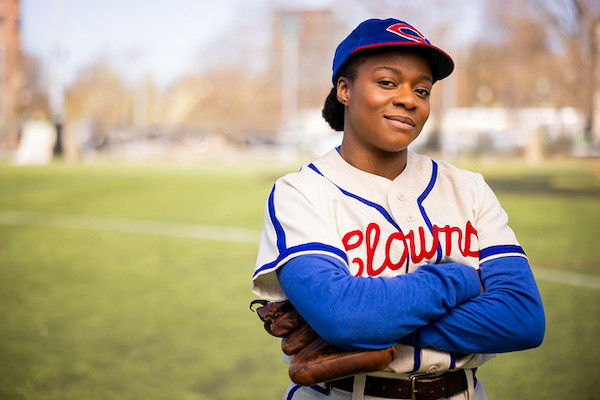Theater Interview: Playwright and Director Lydia R. Diamond on “Toni Stone”
By Robert Israel
“I believe folks coming to the theater will have a great time; they’ll learn about the Negro leagues and about a phenomenal woman.”

Playwright Lydia R. Diamond, the Huntington Theatre’s visiting guest director of her baseball drama Toni Stone. Photo: courtesy of the Huntington Theatre
Flashback 2010: On the day after Christmas, Lydia R. Diamond talks about her play Harriet Jacobs, which she adapted from an autobiographical book Incidents in the Life of a Slave Girl, by Harriet Jacobs (and staged at Central Square Theater in Cambridge). Diamond says she had pulled up stakes from her native Chicago to move to Boston when her husband, John Diamond, joined the Harvard University faculty. During the phone interview, her then-five year old son Baylor can be heard tearing through the apartment. Diamond tells about her life as an actress, playwright, director, and teacher, and details how she left a growing national reputation at the Goodman and other Chicago-area theaters behind. She says, “I was lucky to find my way into the theater community in Boston. I was hired at Boston University, I became a fellow at the Huntington Theatre, I hired an agent, and my career fell into place.”
Flash-Forward 2024: Now aged 55, Diamond lives, teaches, and writes in her native Chicago. Her theater career continues to flourish. She’s in Boston as a visiting guest director of her own play, Toni Stone, set to run at Huntington Theatre’s main stage from May 17 through June 16. Her play was sourced from Martha Ackmann’s book Curveball: The Remarkable True Story of Toni Stone.
Arts Fuse spoke with Diamond before the show rehearsal at the Huntington in Boston.
Arts Fuse: Advance notices about Toni Stone describe it as being “inspired” by Martha Ackmann’s book. You’ve written scripts that have been billed as “adaptations” of works — most notably Harriet Jacobs and the play you adapted from Toni Morrison’s novel The Bluest Eye. What is the distinction between “inspired” by another writer’s work, or adapting it?
Lydia Diamond: The producers contacted me after they had obtained the rights to Martha Ackmann’s book. I read it and my first reaction was dismay and anger. Why didn’t we know more about Toni Stone? Why hadn’t we heard about her groundbreaking role in playing baseball in the Negro Leagues? I mean, we know a lot about Jackie Robinson, for example, and his pioneering achievements breaking through to Major League Baseball. So I felt I had to say yes to writing a play about her. But my script is not strictly an adaptation of Martha’s book the way my work is of Toni Morrison’s novel. When I was writing The Bluest Eye, I wanted to create a homage to Morrison’s book onstage. I wanted audiences to experience her book as if they were reading it. That’s not the case with Toni Stone. I feel like it is important, actually an honor, to do a play about this important figure.

Jennifer Mobock in the role of Toni Stone in the Huntington Theatre production. Photo: Nile Hawver
AF: The Huntington produced one of your original scripts, Stick Fly, which went on to enjoy success in New York. Are you working on your own original scripts now?
Diamond: During the pandemic several people asked me how I was using my time and what I was writing. Someone commented, “You know, Shakespeare wrote some of his best plays during the pandemic during his time.” But that was not the case with me. I am a very slow writer, so my own work takes a long time to develop. During that time I was working on a television script, and I was directing. I also teach, which I have done for many years. When I lived in Boston, I taught at Boston University. Now I teach at the University of Illinois at Chicago. But I hope to return to writing my own plays soon.
AF: So you’re a teacher of theater, a playwright, a director, and, according to your biography, you’ve been an actress, too. Is acting something you want to do again?
Diamond: Absolutely not. I am so happy I’m not acting. I realized, after several years into acting, that I couldn’t be a good actor. I don’t remember things that well. I thought then about acting, and I definitely think this way now — this is torture! So I do the other things — teach, write, and direct. And I find that these other things are extremely rewarding.
AF: Finally, what do you hope audiences will experience when they come to see Toni Stone?
Diamond: First of all, we have the very talented Jennifer Mogbock playing the role of Toni Stone, along with a cast of eight men. And I believe folks coming to the theater will have a great time; they’ll learn about the Negro leagues and about a phenomenal woman. And going to the show is not going to be like taking a dose of historical medicine. I want theatergoers to learn, but I also want them to enjoy a great evening at the theater.
Robert Israel, an Arts Fuse contributor since 2013, can be reached at risrael_97@yahoo.com.

